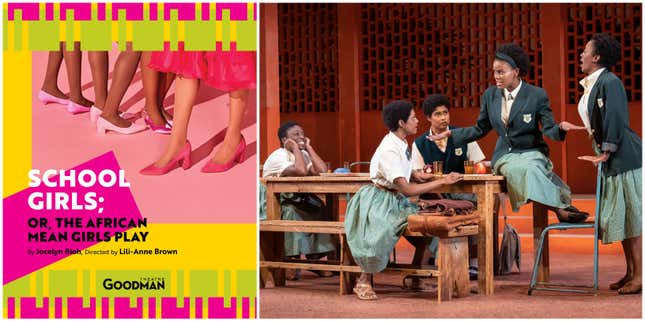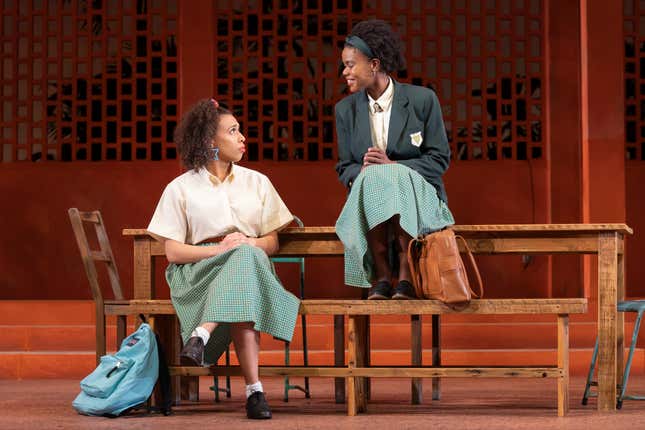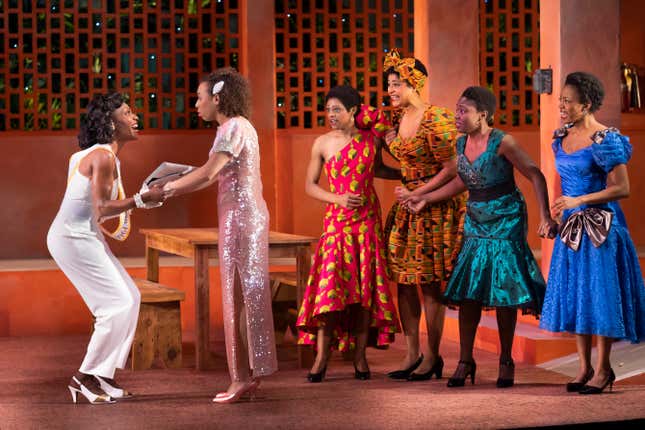
As the COVID-19 epidemic has derailed all of our lives, it has done unimaginable damage to the live entertainment industry, as festival season, concerts and theatrical productions have been unceremoniously postponed or canceled outright, leaving performers, directors, production crews and the venues themselves with gaping holes in their projected incomes.
But as they say in the theater, the show must go on.
Just ahead of the shelter-in-place now enacted in Chicago through April 30 (with a possible further extension if necessary), I had the unwitting foresight to catch a preview of one of the hottest tickets of the city’s theatrical season, playwright Jocelyn Bioh’s School Girls; or, the African Mean Girls Play, making its Chicago premiere at the Goodman Theatre after an acclaimed off-Broadway run. And in an occurrence all too rare, the production well exceeded the hype. Sadly, the show has yet to officially open, as its scheduled opening night was canceled by rightful fears over the spread of COVID-19, but in a self-isolation-friendly spin, it is coming to our homes, via the magic of streaming.
For those of us lucky enough to catch it on stage, Bioh’s play is a delight—and not to be confused for a riff on the Tina Fey-penned modern classic Mean Girls, though both touch on the nuanced dynamics of high-school lunchroom hierarchies. Instead, the mirth and drama between Bioh’s all-black female characters take place at the Aburi Boarding School outside of Accra, Ghana; a very real institution attended by Bioh’s own mother, whose recollection of being an occasional “mean girl” during her own high school years inspired Bioh’s hilarious rendering of life for a group of Ghanaian teenagers in 1986. (Yes, this is also a period piece—cue the nostalgia.)
In Bioh’s narrative, Aburi is a matriarchal enclave where the typical teenage girl-talk of boys—most often, New Edition (“Bobby Brown!” is a running joke)—and grades are only eclipsed by the possibility of being chosen to represent Ghana in the Miss Global Universe pageant. Resident queen bee and brown-skinned beauty Paulina Sarpong (played to precision by Ciera Dawn) has the title in her sights—until the earnest and lighter-skinned Ericka Boafo (Kyrie Courter) transfers into Aburi from the aspirational land of America, sparking some very unhealthy competition. As the plot unfolds, so do a series of revelations that bring painful and still-prevalent truths about colorism and class to the surface of this otherwise bubbly comedy. In fact, so much is packed into the compact 80-minute runtime, perhaps the only complaint is that the audience may be left wanting more of these vivacious characters—I certainly did.

That balance—of tremendous humor with deep-seated pain is one that is central to the black experience, notes director Lili-Anne Brown.
“I’m black—I’m not African, so clearly, the experience of joy and hilarity amidst this sort of bedrock of trauma is my everyday life. So, that’s how I relate to the play,” she tells The Glow Up. “For me, I really felt [Bioh] nailed the tone of black life, be you in Africa or America...I don’t know if there is a word I can use that is appropriate for how [colonization] has affected Africa and the world....it’s so profound.”
As the play illustrates, this is particularly true among black women; even in a world devoid of whiteness, like the one within the walls of Aburi, beauty is still judged by its proximity to it. Yet, as the girls ultimately find, the beauty standards outside Aburi’s walls are even more unattainable.
“It’s a play that just ultimately, I relate to and that I wanted to put on stage for us; for black women. Period,” Brown says, adding, “anybody can enter this play, but this play is for black women, and I’m doing it for black women.”
Initially garnering acclaim in late 2017 during its run at the Lucille Lortel Theater in New York City, School Girls fortuitously preceded a pivotal moment in pageant history, as in 2019, all of the winners of major pageant titles were black women—many of them definitively brown-skinned and wearing naturally textured crowns beneath their tiaras. The juxtaposition was not lost on Brown, who says, “I think it’s the perfect moment to show that not too long ago...no one could imagine even one brown winner or person that had the superlative of ‘most beautiful.’”
Brown, also an actor, says she became a director not out of desire, but necessity: “The things that I wanted to see on stage weren’t being done, weren’t being produced...I really just had to do it myself because nobody was trying to do the kind of plays that I wanted to do.” A Chicago native and well-known luminary within the city’s theater scene, Brown has demonstrated a deft hand as a director, as well as an innate understanding of the myriad human experiences encompassed by blackness. In the space of the last twelve months, she has scored hits directing Ike Holter’s Lottery Day for the Goodman and a rousing Chicago revival of The Color Purple for the more commercial Drury Lane Theatre. Next up, Brown is headed to Washington, D.C.’s Kennedy Center to direct a production based on the work of children’s author Kwame Alexander in October.
Nevertheless, this particular show is going on—and marking an important first that may prove vital in sustaining the theater industry during this crisis. While Goodman’s production of School Girls will reportedly still hit the stage at an as-yet-undetermined date, what was a disappointment to Chicago theatergoers is now a boon for theater-lovers worldwide, as the play is currently available via streaming through April 26. Current ticket holders can access the play free of charge through a password-protected online portal; others are invited to stream the performance on a pay-what-you-can basis, starting at $15.

“As proud as we are to make history as the first Goodman production to appear online before it even opens, we look forward to the day when we can share Jocelyn’s smart, beautiful, provocative and hilarious play with a live audience once again,” said Brown in an announcement. “We as a community will prevail!”
Corrected: Friday, 4/3/20 at 5:33 p.m., ET: An earlier version of this article incorrectly indicated that Brown’s production with the Kennedy Center had been canceled. The production will premiere in October as originally scheduled; the article has been amended to reflect the correction.

